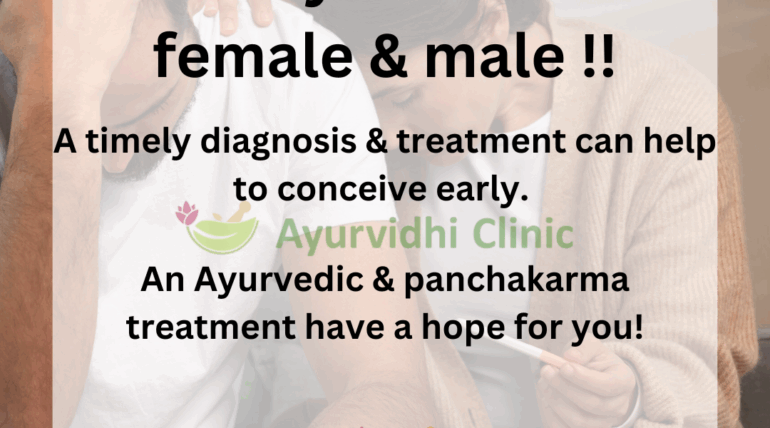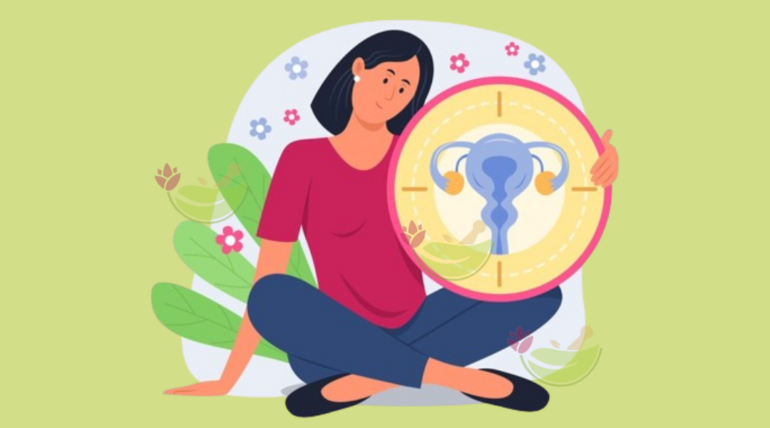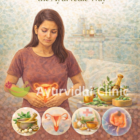Infertility in Modern Times: An Ayurvedic Perspective
In today’s fast-paced world, infertility has emerged as a growing concern among couples aspiring to become parents. With rising stress levels, unhealthy lifestyles, and environmental factors, the ability to conceive naturally has declined significantly. Ayurveda, the ancient science of life, offers a holistic approach to understanding and treating infertility—addressing not just the body, but also the mind and spirit.
What Is Infertility?
Infertility is typically defined as the inability to conceive after one year of unprotected intercourse. While modern medicine often focuses on hormonal levels, reproductive organs, and medical interventions, Ayurveda delves deeper into the root cause, aiming to restore the balance of doshas (Vata, Pitta, and Kapha) and improve reproductive health naturally.
Common Causes of Infertility (According to Ayurveda & Modern View)
Ayurveda categorizes infertility under “Vandhyatva”. The causes can be both physiological and psychological:
In Women:
-
Hormonal Imbalance (e.g. PCOS/PCOD, thyroid disorders)
-
Irregular Menstrual Cycles
-
Blocked Fallopian Tubes
-
Endometriosis
-
Weak Agni (Digestive Fire) leading to toxin accumulation (Ama)
-
Stress & Anxiety
-
Improper Diet (Viruddha Aahar) and sedentary lifestyle
In Men:
-
Low Sperm Count or Motility
-
Varicocele
-
Excessive Alcohol, Smoking or Drug Use
-
Chronic Stress or Insomnia
-
Obesity or Poor Nutrition
Symptoms of Infertility
-
Inability to conceive after regular intercourse
-
Irregular or painful menstruation
-
Erectile dysfunction or premature ejaculation
-
Hormonal acne, unwanted hair growth in women (PCOS symptoms)
-
Frequent miscarriages
-
Emotional disturbances—stress, depression, or anxiety
Ayurvedic Approach to Infertility
Ayurveda doesn’t treat infertility as an isolated condition but focuses on overall well-being and reproductive vitality, also known as Shukra Dhatu in Ayurveda. The key is to balance the doshas, detoxify the body, strengthen the reproductive tissues, and ensure the proper functioning of Agni.
Panchakarma: Detoxification for Fertility Enhancement
Panchakarma, the five-fold detoxification therapy in Ayurveda, plays a crucial role in treating infertility. It helps eliminate toxins (Aama), balance doshas, and rejuvenate the body’s systems—including reproductive organs.
Key Panchakarma Therapies for Infertility:
-
Abhyanga (Oil Massage)
– Enhances blood circulation, reduces stress, balances Vata. -
Swedana (Herbal Steam Therapy)
– Opens channels, improves metabolism and uterine health. -
Virechana (Purgation Therapy)
– Especially helpful in Pitta-related hormonal imbalances. -
Basti (Medicated Enema)
– Most effective for Vata-related infertility. Strengthens reproductive organs and nourishes the Shukra Dhatu. -
Uttara Basti
– A special form of basti administered vaginally or urethrally using medicated oils/ghee. It cleanses and tones the uterus and reproductive tract. -
Nasya (Nasal Therapy)
– Helps reduce stress and hormonal disturbances through the balancing of Prana Vata.
Ayurvedic Herbs for Fertility Support
-
Ashwagandha – Stress reliever, improves sperm count and ovulation
-
Shatavari – Balances female hormones, promotes uterine health
-
Gokshura – Boosts libido and male fertility
-
Guduchi – Enhances immunity and reduces inflammation
-
Kapikacchu (Mucuna Pruriens) – Enhances dopamine and fertility in men
Lifestyle & Diet Tips (Aahaar & Vihaar)
-
Eat fresh, warm, and sattvic food
-
Avoid processed, junk, and incompatible foods
-
Maintain a regular sleep cycle
-
Practice Yoga & Meditation (especially poses like Baddha Konasana, Viparita Karani)
-
Engage in mindful relationships and emotional wellness
Final Thoughts
Infertility is not just a physical issue—it’s deeply connected with your mental, emotional, and spiritual health. Ayurveda offers a time-tested, personalized, and side-effect-free approach to boost fertility by aligning you with your natural rhythms. Through Panchakarma, diet, herbal medicine, and lifestyle changes, many couples have found renewed hope and success in their journey toward parenthood.
Let nature, balance, and ancient wisdom guide your way to fertility and wellness.







Recent Comments